Abstract
Previous investigators have suggested that numerous symptoms used to diagnose depression, such as sleep or appetite disturbance, are non-specific in medically ill patients, and alternative diagnostic criteria should be developed. In the study this hypothesis was tested in Parkinson's disease (PD) by comparing patients with PD who reported a depressive mood with patients having PD but without a depressive mood. Depressed patients showed a significantly higher frequency of both autonomic and affective symptoms of depression. Depressed patients with PD reported a significantly higher frequency of worrying, brooding, loss of interest, hopelessness, suicidal tendencies, social withdrawal, self-depreciation, ideas of reference, anxiety symptoms, loss of appetite, initial and middle insomnia, and loss of libido when compared with non-depressed patients. No significant between-group differences, however, were observed in the frequency of anergia, motor retardation, and early morning awakening.
Full text
PDF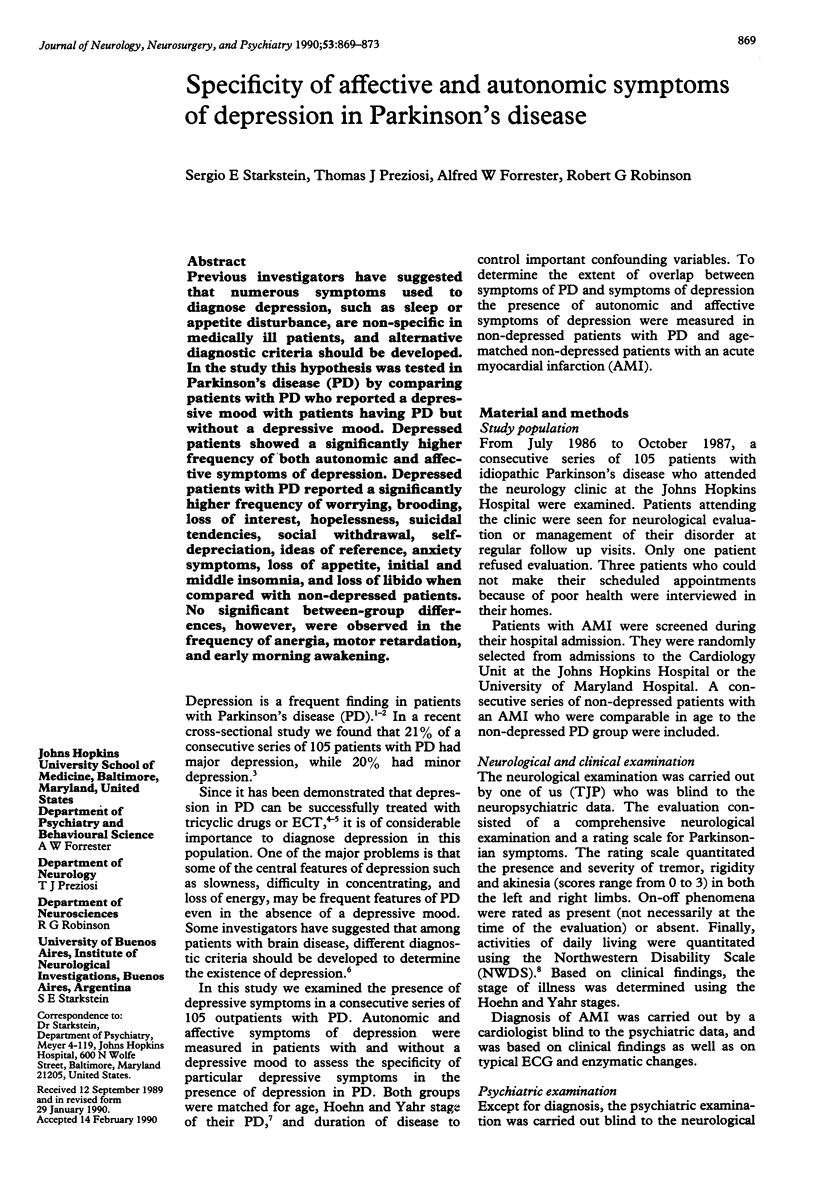
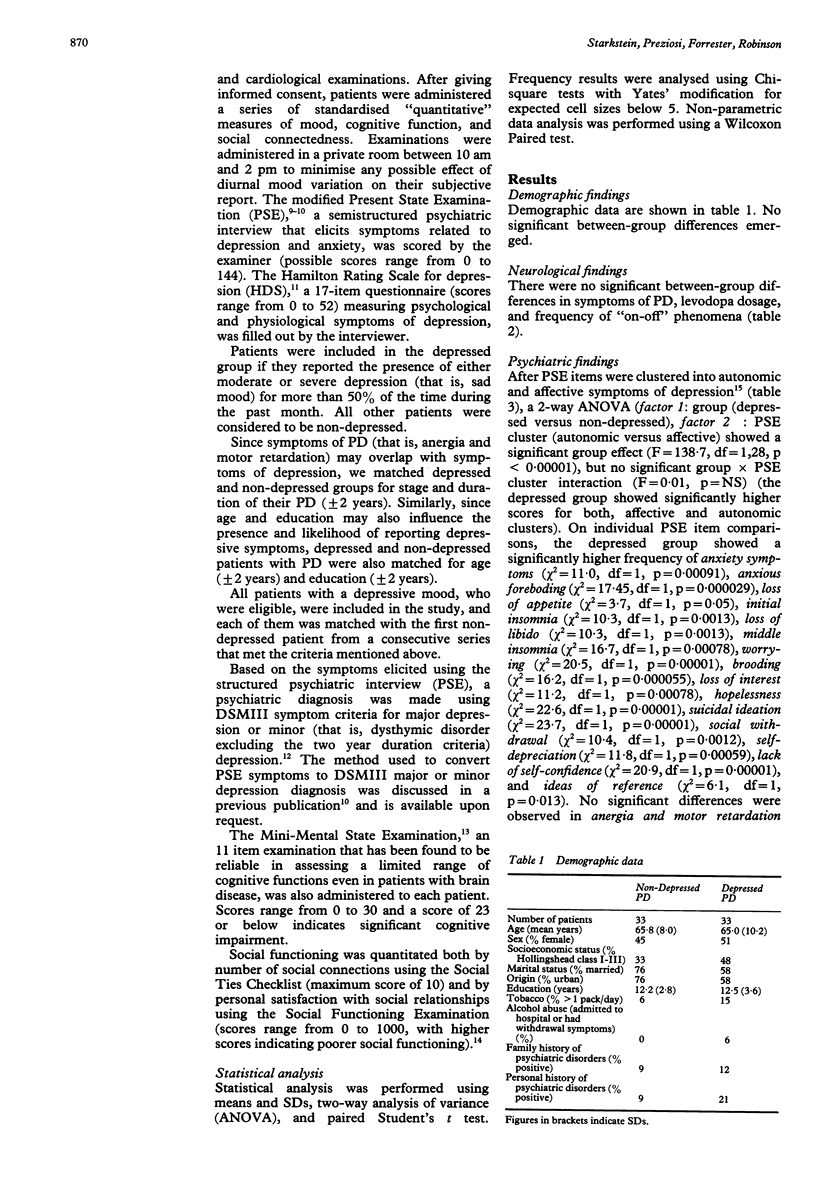
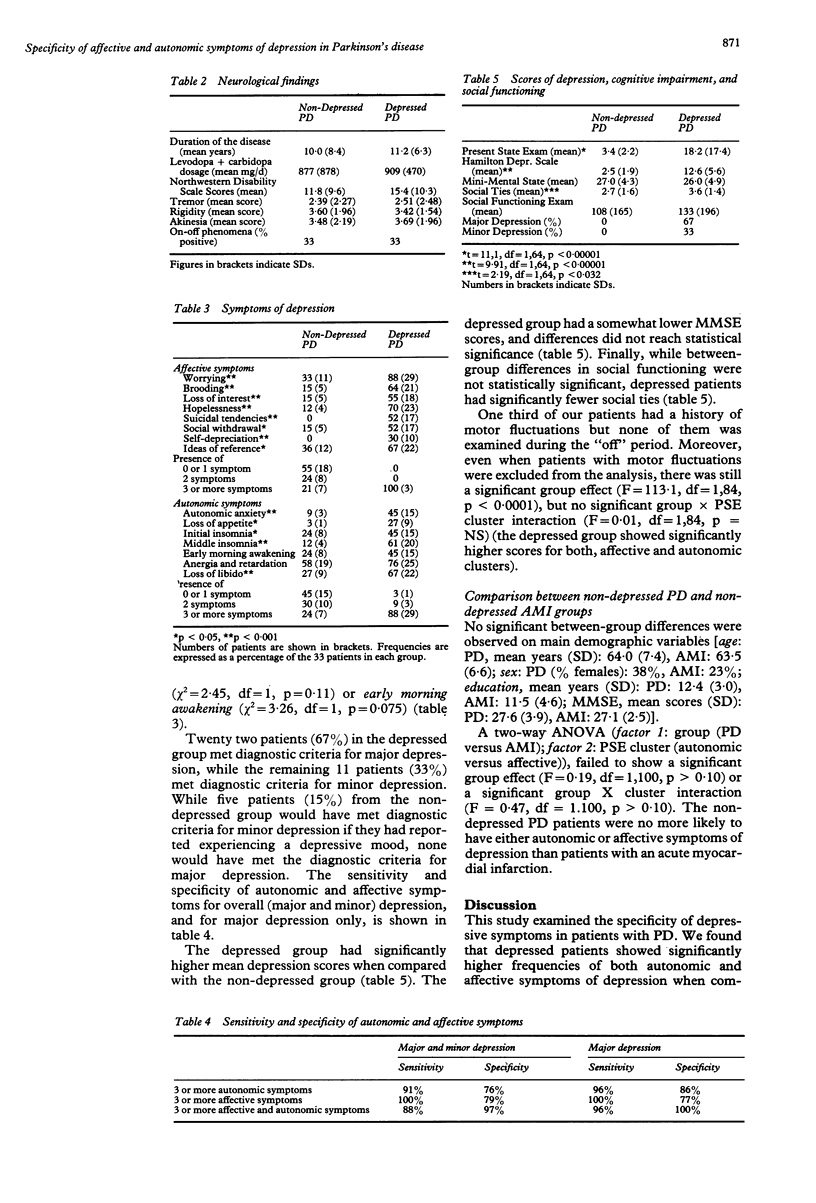
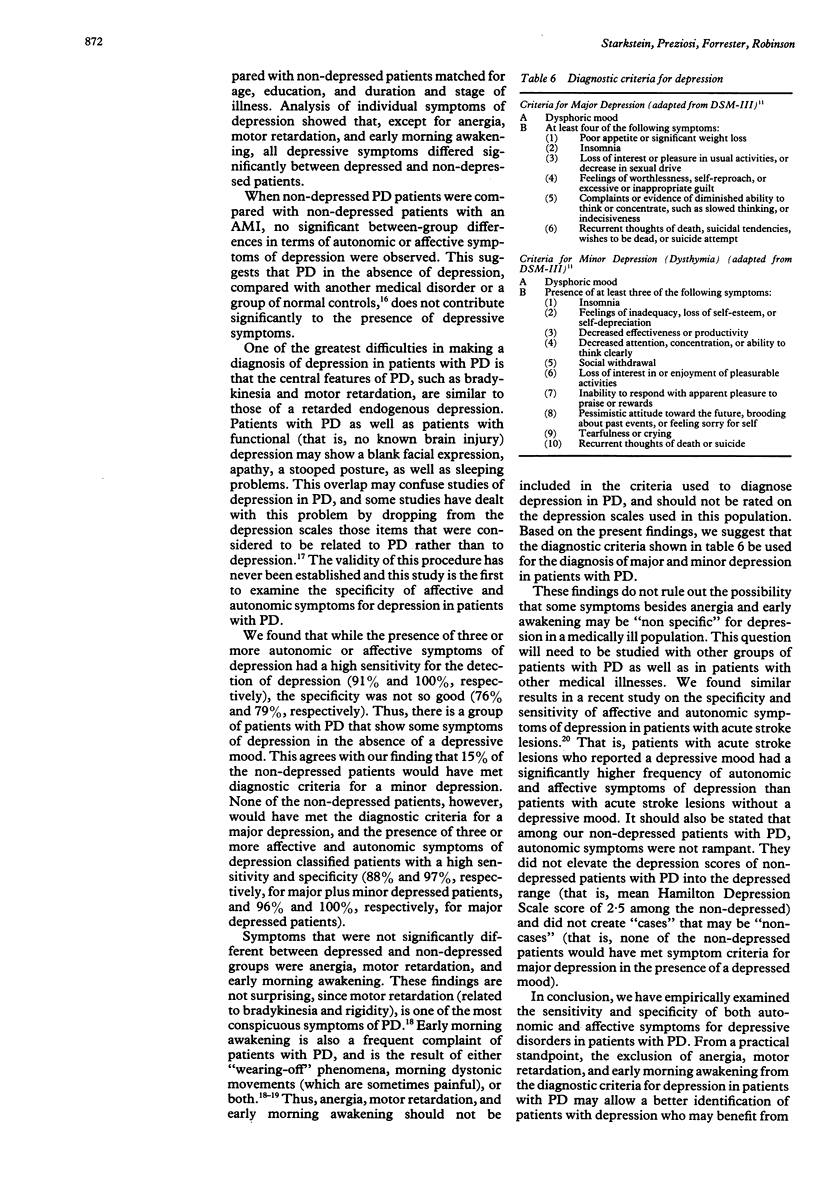
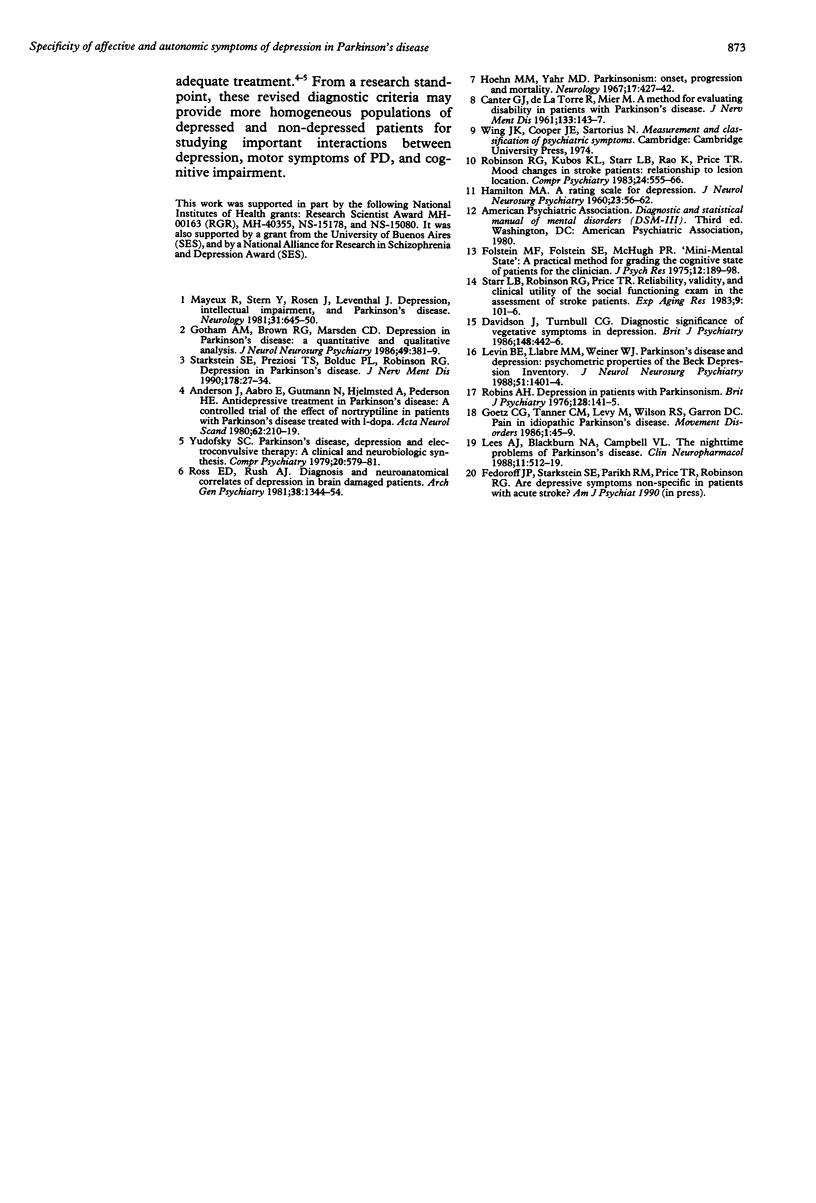
Selected References
These references are in PubMed. This may not be the complete list of references from this article.
- Andersen J., Aabro E., Gulmann N., Hjelmsted A., Pedersen H. E. Anti-depressive treatment in Parkinson's disease. A controlled trial of the effect of nortriptyline in patients with Parkinson's disease treated with L-DOPA. Acta Neurol Scand. 1980 Oct;62(4):210–219. doi: 10.1111/j.1600-0404.1980.tb03028.x. [DOI] [PubMed] [Google Scholar]
- CANTER G. J., DE LA TORRE R., MIER M. A method for evaluating disability in patients with Parkinson's disease. J Nerv Ment Dis. 1961 Aug;133:143–147. doi: 10.1097/00005053-196108000-00010. [DOI] [PubMed] [Google Scholar]
- Davidson J., Turnbull C. D. Diagnostic significance of vegetative symptoms in depression. Br J Psychiatry. 1986 Apr;148:442–446. doi: 10.1192/bjp.148.4.442. [DOI] [PubMed] [Google Scholar]
- Folstein M. F., Folstein S. E., McHugh P. R. "Mini-mental state". A practical method for grading the cognitive state of patients for the clinician. J Psychiatr Res. 1975 Nov;12(3):189–198. doi: 10.1016/0022-3956(75)90026-6. [DOI] [PubMed] [Google Scholar]
- Goetz C. G., Tanner C. M., Levy M., Wilson R. S., Garron D. C. Pain in Parkinson's disease. Mov Disord. 1986;1(1):45–49. doi: 10.1002/mds.870010106. [DOI] [PubMed] [Google Scholar]
- Gotham A. M., Brown R. G., Marsden C. D. Depression in Parkinson's disease: a quantitative and qualitative analysis. J Neurol Neurosurg Psychiatry. 1986 Apr;49(4):381–389. doi: 10.1136/jnnp.49.4.381. [DOI] [PMC free article] [PubMed] [Google Scholar]
- HAMILTON M. A rating scale for depression. J Neurol Neurosurg Psychiatry. 1960 Feb;23:56–62. doi: 10.1136/jnnp.23.1.56. [DOI] [PMC free article] [PubMed] [Google Scholar]
- Hoehn M. M., Yahr M. D. Parkinsonism: onset, progression and mortality. Neurology. 1967 May;17(5):427–442. doi: 10.1212/wnl.17.5.427. [DOI] [PubMed] [Google Scholar]
- Lees A. J., Blackburn N. A., Campbell V. L. The nighttime problems of Parkinson's disease. Clin Neuropharmacol. 1988 Dec;11(6):512–519. doi: 10.1097/00002826-198812000-00004. [DOI] [PubMed] [Google Scholar]
- Levin B. E., Llabre M. M., Weiner W. J. Parkinson's disease and depression: psychometric properties of the Beck Depression Inventory. J Neurol Neurosurg Psychiatry. 1988 Nov;51(11):1401–1404. doi: 10.1136/jnnp.51.11.1401. [DOI] [PMC free article] [PubMed] [Google Scholar]
- Mayeux R., Stern Y., Rosen J., Leventhal J. Depression, intellectual impairment, and Parkinson disease. Neurology. 1981 Jun;31(6):645–650. doi: 10.1212/wnl.31.6.645. [DOI] [PubMed] [Google Scholar]
- Robins A. H. Depression in patients with Parkinsonism. Br J Psychiatry. 1976 Feb;128:141–145. doi: 10.1192/bjp.128.2.141. [DOI] [PubMed] [Google Scholar]
- Robinson R. G., Kubos K. L., Starr L. B., Rao K., Price T. R. Mood changes in stroke patients: relationship to lesion location. Compr Psychiatry. 1983 Nov-Dec;24(6):555–566. doi: 10.1016/0010-440x(83)90024-x. [DOI] [PubMed] [Google Scholar]
- Ross E. D., Rush A. J. Diagnosis and neuroanatomical correlates of depression in brain-damaged patients. Implications for a neurology of depression. Arch Gen Psychiatry. 1981 Dec;38(12):1344–1354. doi: 10.1001/archpsyc.1981.01780370046005. [DOI] [PubMed] [Google Scholar]
- Starkstein S. E., Preziosi T. J., Bolduc P. L., Robinson R. G. Depression in Parkinson's disease. J Nerv Ment Dis. 1990 Jan;178(1):27–31. doi: 10.1097/00005053-199001000-00005. [DOI] [PubMed] [Google Scholar]
- Starr L. B., Robinson R. G., Price T. R. Reliability, validity, and clinical utility of the social functioning exam in the assessment of stroke patients. Exp Aging Res. 1983 Summer;9(2):101–106. doi: 10.1080/03610738308258434. [DOI] [PubMed] [Google Scholar]
- Yudofsky S. C. Parkinson's disease, depression, and electroconvulsive therapy: a clinical and neurobiologic synthesis. Compr Psychiatry. 1979 Nov-Dec;20(6):579–581. doi: 10.1016/s0010-440x(79)80010-3. [DOI] [PubMed] [Google Scholar]


